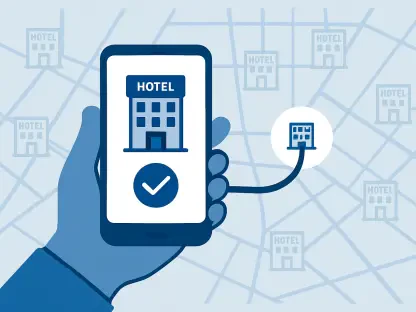The landscape of the global hospitality industry has undergone a significant transformation in the post-pandemic era. With e-commerce activities rising by 20%, multi-channel merchants like hotels and online travel agencies (OTAs) have experienced a boon. However, this increase in online transactions has also led to a surge in digital fraud, presenting a new layer of challenges for these businesses. While the opportunity for revenue growth is immense, the risk of fraud cannot be overlooked. The rising incidence of digital fraud underscores the need for sophisticated anti-fraud measures tailored specifically for the hospitality sector.
As hotels and OTAs leverage digital platforms to reach a broader audience and streamline operations, they become more vulnerable to increasingly sophisticated fraud schemes. These cybercriminal activities not only threaten the financial health of hospitality businesses but also jeopardize customer trust. The necessity to safeguard every transaction has never been more urgent. The post-pandemic shift towards online transactions has fundamentally altered the dynamics of fraud, making it essential for hospitality businesses to stay ahead with cutting-edge security measures. Understanding this evolving landscape is crucial to implementing effective fraud prevention strategies that can protect businesses and their customers alike.
The Surge in E-Commerce and Its Implications
The COVID-19 pandemic accelerated the shift toward online transactions, pushing hospitality businesses to adapt rapidly. This shift has been largely beneficial, enabling hotels and OTAs to reach a broader audience and streamline operations. However, with the increase in e-commerce activities comes a heightened exposure to digital fraud. Fraudsters are increasingly targeting online channels, exploiting vulnerabilities within the system. Card testing is one prevalent form of fraud, where criminals use stolen card information for small transactions to validate the card’s legitimacy. This practice often leads to no-shows and chargebacks, resulting in financial losses for hotels.
The rise in e-commerce has also led to an increase in “friendly fraud” chargebacks. These occur when legitimate cardholders dispute charges post-transaction. Approximately 71% of e-commerce transaction disputes arise from service errors, further complicating the financial landscape for hotels. Friendly fraud is deceptively challenging to manage as it blurs the lines between genuine and fraudulent claims. Hotels find themselves navigating complex scenarios where distinguishing intent is not straightforward, adding another layer of difficulty in mitigating fraud.
Despite the benefits of increased online activity, the accompanying surge in fraud demands that hotels and OTAs continuously evolve their fraud detection and prevention mechanisms. Relying on outdated methods is no longer sufficient; businesses must adopt advanced technologies that can adapt to emerging threats. Staying vigilant and proactive is essential to ensure that the advantages of e-commerce growth are not overshadowed by the escalating risks of digital fraud. As the industry continues to expand its online footprint, integrating comprehensive security measures becomes indispensable.
Financial Impact of Rising Fraud
The financial impact of fraud on the hospitality industry is significant. Chargebacks, for instance, can cost hotels approximately £150 billion annually. Each pound lost in chargebacks translates to a £3.75 revenue impact when factoring in fees and overheads. Additionally, high chargeback rates can lower transaction authorization rates due to false declines. Persistent high chargeback rates can also lead to severe repercussions such as increased transaction fees, withheld funds, or suspension of card services. This creates a ripple effect, affecting the overall financial health of hospitality businesses. The more frequent and severe the fraud, the greater the financial burden, which can erode profitability and strain resources.
Even traditional card fraud remains a threat, particularly in the hospitality sector where card-not-present (CNP) transactions are common. Hotels often rely on MOTO (Mail Order/Telephone Order) payments, which do not benefit from modern security measures like 3DS (3-D Secure) authentication, further exposing them to fraud risks. With global card fraud losses expected to reach £27.4 billion by 2024, the need for enhanced fraud prevention measures is paramount. Ignoring these persistent threats only increases the likelihood of financial losses that could have been prevented with appropriate safeguards.
The combination of digital and traditional fraud risks forms a formidable challenge for hoteliers, who must juggle robust fraud prevention with delivering seamless customer experiences. The financial toll of fraud is not limited to direct losses; it also encompasses indirect costs like damage to reputation and loss of customer trust. Hence, it is essential for hospitality businesses to invest in comprehensive, adaptable fraud prevention strategies to mitigate these risks effectively. By understanding the broad financial implications, hoteliers can prioritize their efforts to safeguard their revenue and maintain financial stability.
Proactive Fraud Management Strategies
Addressing the rising threat of fraud requires a proactive approach. This begins with establishing ownership over fraud metrics among relevant teams and ensuring accurate, compliant data management. Implementing a risk-based 3DS authentication process can significantly mitigate fraud risks. Continuous investment in advanced fraud detection technologies is also crucial. These technologies help identify and prevent fraudulent transactions before they occur, thereby safeguarding the financial health of the business. Staying attuned to emerging fraud patterns and industry best practices is essential in maintaining a robust fraud prevention strategy.
Guestline’s GuestPay platform provides a comprehensive solution tailored specifically for the hospitality sector. It incorporates sophisticated fraud detection algorithms, secure payment options like Apple Pay and Paybylink, automated chargeback notifications, and clear fraud and decline codes. Such an integrated solution enables hoteliers to manage fraud more effectively. By leveraging these advanced tools, hotels can stay one step ahead of fraudsters and protect their businesses from significant financial damage.
Proactive fraud management extends beyond just implementing new technologies. It involves continuous training for staff, conducting regular audits, and staying informed about the latest fraud trends. A combination of human vigilance and technological solutions is pivotal in creating a secure transaction environment. By adopting a holistic approach that encompasses technology, staff education, and industry collaboration, the hospitality industry can build a resilient defense against the evolving landscape of fraud. This comprehensive strategy ensures long-term protection and operational continuity.
Sector-Specific Solutions for Fraud Prevention
The need for sector-specific solutions cannot be overstated. Guestline’s technology exemplifies the kind of integrated, customized approach necessary to address the unique vulnerabilities of the hospitality industry. By offering industry-specific solutions, businesses can better tackle the multifaceted nature of fraud. Guestline’s platform highlights the importance of tailored fraud prevention measures. With features such as real-time fraud detection and automated management tools, it equips hoteliers with the necessary tools to combat fraud effectively. Implementing these solutions can help hotels reduce financial losses and maintain operational continuity.
Moreover, proactive fraud management extends beyond just technology. It involves continuous training for staff, regular audits, and staying informed about the latest fraud trends. By adopting a holistic approach that combines technology with best practices, the hospitality industry can create a more secure transaction environment. The integration of technology and human vigilance forms a robust framework to counter the evolving tactics of fraudsters.
Sector-specific solutions are crucial because they address the distinctive challenges faced by different industries. In the case of hospitality, understanding the transactional dynamics specific to hotels and OTAs allows for more effective fraud prevention strategies. Guestline’s platform demonstrates the value of customized solutions that are designed with the specific needs of the hospitality sector in mind. By focusing on the unique vulnerabilities and transactional patterns of the industry, these solutions provide comprehensive protection against fraud, ensuring financial resilience and customer trust.
Conclusion
The global hospitality industry has seen a major shift in the post-pandemic era. E-commerce activities have climbed by 20%, benefiting multi-channel merchants like hotels and online travel agencies (OTAs). However, this uptick in online transactions has also triggered a rise in digital fraud, adding new challenges for these businesses. While the potential for revenue growth is significant, the threat of fraud remains substantial. The increasing rate of digital fraud highlights the need for advanced anti-fraud measures tailored to the hospitality sector.
As hotels and OTAs use digital channels to reach a wider audience and streamline their operations, they become more exposed to complex fraud schemes. These cybercrimes not only pose financial risks to hospitality businesses but also erode customer trust. The urgency to secure every transaction has never been higher. The move toward online transactions in the post-pandemic world has fundamentally changed the fraud landscape, necessitating that hospitality businesses adopt state-of-the-art security measures. Recognizing this evolving environment is essential for implementing effective fraud prevention strategies to protect both businesses and their customers.









